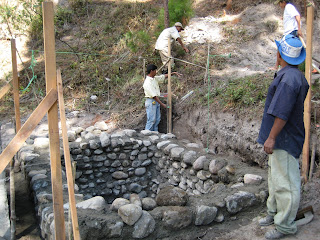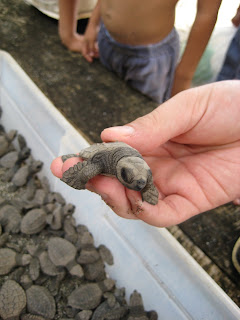
"UMIDI KA MABIDI MA SMUMIDI. KOIN MARAGA NAKA LAKA RAKA SMIMBTA. DERE AUNE JUMABEN." (Note: while this is not actually Ngäbere, the native dialect, it might as well be to the untrained ear.)
What the hell is that? I roll over in bed and try to make sense of what I'm hearing. I briefly consider that I may have taken one too many malaria pills the night before, but settle on the fact that it is indeed the middle of the night and someone is outside my house, no underneath my house rather, talking to himself.
 Sunset on the Pacific.
Sunset on the Pacific.I climb out of my mosquito net and go lay down on my porch above the man talking. I don't know who he is. After listening for a minute or two I can tell that he is praying. He has come a long way and is blessing every man, woman, child, animal, house, and farm he has passed on his journey. It's clear that this prayer won't be ending anytime soon, so I climb into my hammock and stare out at the night's sky.
 Peña Blanca from a distance.
Peña Blanca from a distance.With the nearest electrical source 15 miles away, and the nearest city of any reasonable size over 50 miles away, light pollution is not a problem. I can see the milky way dipping into the horizon and the southern cross peaking out over the hills. A satellite streaks across the sky and I remind myself that according to the Ngäbes I live with there are no satellites. This fast moving star is the "Star of David" sent to watch over us. Ya, I think, it's watching over us in a way.
Finally I hear the man bless the house under which he will sleep and finish his prayer. I fall back asleep in my hammock.

We termed this pose "The Perched Eagle".
The drop in front would make hang gliders envious.
"Choi, Choi, WAKE UP! Choi, what time is it?"
I moan as I'm woken with the most commonly asked question of my Peace Corps service. For some reason the indigenous people have decided I am the keeper of time.
"Seven," I shout back and wonder if he is going to reset his watch to my guess at the time.

I'm up and ready to work. I grab by stuff and walk through the community shouting along the way for the men to come help. Every other house I pass hands me a sugared cup of warm coffee which I chug and keep walking. The kids all run out to greet me and yell in perfect English, "What's up chillin chillin!?"

It's a daily reminder and one of the only remains of English classes I gave once upon a time. The kids melded the question and answer into one phrase and yell it every time they see me. Even those barely able to walk have been taught by their siblings to yell "CHILLIN CHLLIN!" when I pass.

This morning we will be building walls on a multipurpose building in the community. One man points to my bucket of tools and asks,
"What's that?"
I look at the bucket and look back at him.
"It's a bucket of tools," I say.
"A bucket of tools?" the men mumble as they pull items out one by one and inspect them like they're foreign objects. Before I know it I've got my own indigenous version of Teenage Mutant Ninja Turtles on my hands. One guy has the hand drill propped like a machine gun and is pretending to mow down a line of trees. Another is looking down the hand level like it's a scope. A third is swinging a mallet like it's a baseball bat.
 Granito de Oro.
Granito de Oro.
After much explaining and laughing we're able to get a few hours of work done and are handed coconut shells filled with rice and a small piece of mystery meat by a woman in the community. "Mrore!" she shouts in my ear as she gives me the bowl, letting me know it's food. We all find our spots in the dirt and sit to eat. I get the only spoon, everyone else eats with their fingers. I stopped arguing long ago but still feel bad.
I probe the cube of meat with hesitancy, as I don't recognize it. My mind runs through some possibilities: armadillo, turtle, a large rodent? It tastes fine, whatever it is, and I decide not to ask. "Rabbit," someone says, reading the question on my face.
Lunch is over and a friend of mine drives a machete into the ground in front of me. He points to it asks me, "Do you know what that is?"
"A machete," I respond.
"No, that's my bucket of tools," he says as everyone chuckles and I sit humbled.
 An Embera family in Playa del Muerto.
An Embera family in Playa del Muerto.
A group of us are off, on a hike into the hills to cut bamboo for walls on a house. On the hike out the men want to hear stories about my recent trip to a Balsaria, a festival that provides a fascinating yet violent insight into the Ngäbe culture (for more stories about Balsaria see the March 2007 article "Punch, Kick, Throw Sticks!") The challenge for me is that they only want to hear about it in their native dialect, not Spanish.
I fumble with their language, but am able to put together simple sentences like, "Man hit man win woman."
They laugh and smile at me, the white man, trying to speak their language and participating in their lives.
 The ink is a dye from the jungle that lasts several weeks on the skin.
The ink is a dye from the jungle that lasts several weeks on the skin.
An hour later and we've arrived. The men are experts with their machetes and begin to cut and strip bamboo far more quickly than I can. I bow out to stack and sort the cut bamboo, a position usually reserved for the children, because I'm just getting in their way.
After several hours of cutting it's time to divvy up the loads and head back.
"Choi, how many kintales do you want?" Milisciado asks me.
"Kintales?" I ask, stressing the fact that he made the world plural (one kintal is 100 pounds).
"Tell you what," I direct at the group, "I'll take zero kintales and keep up with you all on the walk back. One kintal and I'll take twice as long as you. Or, two kintalkes and I'll be staying the night here."
"Oh, Choi," one guy laughs, "you've got shoes on, you're fine! Give him a kintal and a half."
They each take 2 kintales themselves. I must outweigh each of them by 75 pounds but lack their incredible skill of carrying enormous loads. They are the Sherpas of Latin America.
More Emberas.
We all load up and start walking. The rest of the group is quickly out of site as I pace myself for the journey back.
Shortly I pass two gentlemen walking the other way on the trail. They stop me to ask a question and I'm more than happy to take a break. I pull out my watch in anticipation of what they are about to ask but surprisingly they don't want to know what time it is.
"Are the soldiers where you come from the same size as you?" One of the two inquires.
I fight to hold back laughter. "Every last one of them."
One of the guys turns to his friend, "May God have mercy on our souls if we ever go to war with his country."
"And may God have mercy on our souls if the only allowable weapons are balsa sticks and machetes," I respond.
Embera women dancing.
I'm back on the trial and fighting to keep my mind off the heavy load on my shoulders. My thoughts drift for a while but land on memories of a girl I said goodbye to when I left home, now almost two years ago. A girl I still think of often. I start singing to myself a line from a song by Maná:
"¿Amor, donde estarás? Manda un mensaje, una señal. Y no, no pararé, no viviré sin ti amor."

Don't worry grandma, it's not permanent.
Why you gotta be so depressing? I switch to a popular Kanye song.
"Work it, make it, do it, makes us harder, better, faster, stronger. N-n-now that that don't kill me can only make me stronger. I need you to hurry up now `cause I can't wait much longer."
¡SHIT! That is an enormous snake. It's either a coral snake or a king snake. The difference between the two, this far from medical help, can be life or death to a human who draws a bite.
I freeze in my tracks and watch it stare at me from the trail a few feet away. I try to remember how that stupid rhyme goes matching the colors to the outcome of the bite. Red, orange, blue, sucks to be you. No, that can't be right, there is no blue on the king or the coral.
While I stand and make up silly rhymes about colors and misfortunes the snake continues on his way and before long so do I.
Back to walking. Back to thinking. My thoughts land on Nicolas Cage in The Rock. If the snake were to have bitten me I'd of dropped to my knees, slammed the epipen into my thigh, and lit the flares, CALL OFF THE FIGHTERS!
Enough of the childish thoughts, I think.
I'm back in the community. I drop the bamboo and collapse on the ground drenched in sweat.
Children rush out and scream, "What's up chillin chillin!" One child asks in Spanish, "What took you so long?"
I respond with a line from the same Kanye song in English:
"Bow in the presence of greatness. You should be honored by my lateness."
I sit up as I'm handed two bowls. One full of coffee, the second is overflowing with taro, a root vegetable. I take off my signature headband and wipe my hands on my shorts before I dive into my dinner.
One man asks how I get my hair the color it is. Another points to signs of my developing widow's peak and is clearly puzzled.
I tell them that my hair is the color it is because I've spent my life praying to the hair Gods. The early notches in my hairline are a sign of extreme wisdom.
They're clearly impressed but want to know who the hair God is. It's now well into dusk and I point to a serendipitously timed passing of their Star of David.
"That is our hair God."
Jatwaita (until next time)
Choi
The canal.

Sunset from my community.

Balsaria.
Throw sticks!
 That's a dead tiger strapped to his back for good luck.
That's a dead tiger strapped to his back for good luck.
 Fishing in the community pond.
Fishing in the community pond. Confused children.
Confused children. Happy children.
Happy children. The only tool or piece of hardware used in constructing this house was a machete.
The only tool or piece of hardware used in constructing this house was a machete.







.jpg)


















.JPG)
 The towers are complete!
The towers are complete!









 A freshly hatched turtle in Panama.
A freshly hatched turtle in Panama.











 The beach, Playa Zancudo, Costa Rica.
The beach, Playa Zancudo, Costa Rica.